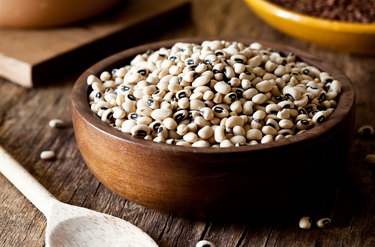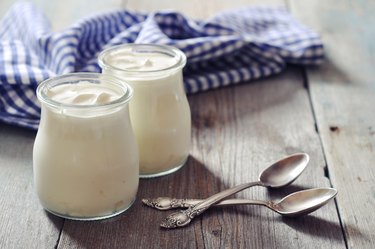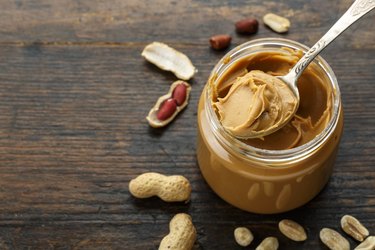Molybdenum is a trace mineral that's not often talked about but plays a vital role in the body.
Molybdenum (pronounced muh-lib-di-num) is an essential nutrient, which means your body can't make it and you have to get it from your diet. But because it's so common in food and our bodies only require a small amount, cases of molybdenum deficiencies are extremely uncommon in the U.S. and are usually related to a rare metabolic disorder, per Oregon State University.
Video of the Day
Video of the Day
Your body requires molybdenum to act as a cofactor for certain enzymes, triggering them into action. These enzymes are called xanthine oxidase, aldehyde oxidase and sulfite oxidase, and they are essential for amino acid creation, per the National Academies Press. They also prevent the buildup of sulfites and help the liver metabolize, or break down, toxins such as alcohol and certain drugs.
How Much Molybdenum Do You Need Per Day?
Most adults need 45 micrograms of molybdenum per day, according to the National Institutes of Health (NIH). If you're pregnant or breastfeeding, your needs are slightly higher, at 55 micrograms per day.
The upper intake level (UL), or the amount you shouldn't exceed, is 2,000 micrograms of molybdenum per day.
Legumes are one of the best food sources of molybdenum, but this trace mineral can also be found in whole grains, fruits, vegetables, dairy products and even some animal organs. A varied, balanced diet can help you reach your daily requirement.
Here, you'll find a list of foods rich in molybdenum, per the NIH. Note that the Food and Drug Administration (FDA) calculates its Daily Value (DV) percentages based on eating 45 micrograms of molybdenum per day.
1. Black-Eyed Peas: 288 mcg, 640% Daily Value (DV)

When you hear black-eyed peas, you might instantly think of the band, but don't discount these legumes when it comes to their nutrient content. It turns out that black-eyed peas are one the of top sources of molybdenum: A 1/2 cup cooked offers 640 percent of the DV.
Try these healthy legume recipes to transform your canned or dry black-eyed peas into something special.
2. Lima Beans: 104 mcg, 231% DV
Like other legumes, lima beans are one of the best molybdenum foods, providing 231 percent of the DV per cooked 1/2-cup serving. Lima beans are also rich in fiber, protein, copper, folate and thiamin.
3. Beef Liver: 104 mcg, 231% DV
Beef liver may not be something you think of preparing every day, but you might want to reconsider that if you're aiming to increase your molybdenum intake. Three ounces of pan-fried beef liver provides 231 percent of the DV.
4. Shredded Wheat Cereal: 30 mcg, 66% DV
It's no question that legumes are the ultimate molybdenum food source, but you can also find this trace mineral in many grains and cereals. Shredded wheat cereal has 66 percent of the DV for molybdenum per 1-cup serving.
A bowl of shredded wheat is also an excellent source of iron and vitamin B12. But try choosing the non-frosted shredded wheat varieties when you can as they tend to be lower in sugar.
5. Low-Fat Yogurt: 26 mcg, 58% DV

Yogurt is touted as a healthy food option for many reasons — it's high in protein, calcium and vitamin D. Plus, a 1-cup serving of plain low-fat yogurt gives you 58 percent of the DV for molybdenum.
If you're only used to eating yogurt for breakfast or as a snack, switch it up and try these high-protein yogurt recipes for dinner.
6. Low-Fat Milk: 22 mcg, 49% DV
Another dairy molybdenum food source is milk, which may come as no surprise considering yogurt is also on the list. One cup of 2 percent milk provides 49 percent of the DV for molybdenum.
This creamy beverage is a nutritional powerhouse, high in protein, calcium, vitamins A and B12, riboflavin, phosphorus, zinc and selenium. For a refreshing way to enjoy milk, try using it in these healthy smoothie recipes.
7. Baked Potato: 16 mcg, 36% DV
Potatoes often get flack for their carbohydrate content and are often outshined by the health halo of sweet potatoes, but they are not to be ignored when talking about molybdenum. One medium baked potato with skin has 36 percent of the DV for molybdenum.
Try these healthy potato recipes next time you have no clue what to do with the taters sitting on your counter.
8. Banana: 15 mcg, 33% DV
Bananas are so versatile — you can add them to breakfasts, desserts or even take them with you as a portable snack. They are also quite nutritious and a good source of essential minerals like magnesium, copper, potassium and — you guessed it — molybdenum. A medium banana provides 33 percent of the DV for molybdenum.
A bonus attributed to bananas — especially green bananas — is their resistant starch, which is resistant to digestion in the small intestine and is associated with gut health and blood sugar control benefits, according to a June 2019 review in the journal Nutrients. Get creative with these healthy banana recipes (that also happen to be high in protein).
9. Whole-Wheat Bread: 12 mcg, 27% DV
When it comes to whole-wheat vs. white bread, it's no question that whole-wheat bread boasts more benefits. One of those benefits happens to be that it is an excellent source of molybdenum: One slice offers 27 percent of the DV.
If you have a loaf (or even just some extra slices) on hand, try making these high-protein sandwich recipes.
10. Peanuts: 11 mcg, 24% DV

Fun fact: Peanuts are not technically nuts but are actually legumes. That may be why they are so high in molybdenum, with 1 ounce of dry-roasted peanuts providing 24 percent of the DV.
Peanuts are also packed with heart-healthy unsaturated fats and other heart-protective nutrients such as magnesium, potassium and phytonutrients.
- Linus Pauling Institute: "Molybdenum"
- National Institutes of Health: "Molybdenum"
- National Academies Press (US): "Dietary Reference Intakes for Vitamin A, Vitamin K, Arsenic, Boron, Chromium, Copper, Iodine, Iron, Manganese, Molybdenum, Nickel, Silicon, Vanadium, and Zinc."
- FDA: "Daily Value on the New Nutrition and Supplement Facts Labels"
- MyFoodData
- Nutrients: "Health Benefits of Green Banana Consumption: A Systematic Review"